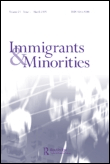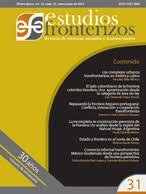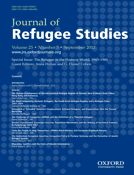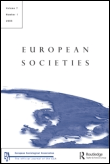
Journal of International Migration and Integration
Scope & Guideline
Navigating the Complexities of Migration and Cultural Integration
Introduction
Aims and Scopes
- Interdisciplinary Research on Migration:
The journal publishes studies that draw from various disciplines, including sociology, economics, political science, and anthropology, to explore the complexities of migration and integration. - Focus on Refugee and Asylum Seeker Experiences:
A significant portion of the research is dedicated to understanding the experiences of refugees and asylum seekers, emphasizing their integration challenges and the policies affecting their resettlement. - Economic Integration and Labor Market Outcomes:
Research often investigates the economic integration of migrants, including labor market participation, wage disparities, and the impact of immigration policies on economic outcomes. - Social Networks and Community Integration:
The journal highlights the role of social networks and community support in the integration process, exploring how relationships and community engagement facilitate or hinder successful integration. - Policy Analysis and Advocacy:
Papers frequently analyze migration policies and their implications for integration, aiming to inform policymakers and advocate for more effective and inclusive approaches. - Cultural Identity and Belonging:
The journal examines how cultural identity influences the integration experience, including the negotiation of belonging and the effects of discrimination and social exclusion.
Trending and Emerging
- Human Rights and Protection for Migrants:
There is an increasing emphasis on the human rights of migrants, particularly regarding asylum seekers and refugees, highlighting the need for protective policies and practices. - Mental Health and Well-Being of Migrants:
Recent studies focus on the mental health challenges faced by migrants, particularly in the context of trauma, social isolation, and the impact of migration policies on psychological well-being. - Impact of COVID-19 on Migration Patterns:
The pandemic has generated significant research interest in how COVID-19 has affected migration trends, integration processes, and the socio-economic conditions of migrants. - Technology and Migration:
Emerging research explores the role of technology in facilitating migration and integration, including the use of social media and digital platforms for connection and support. - Intersectionality in Migration Studies:
There is a growing focus on intersectionality, examining how various identities (such as race, gender, and socio-economic status) intersect to shape the migration and integration experience. - Environmental Migration and Climate Change:
Increasing attention is being paid to the impacts of climate change on migration patterns, with studies exploring how environmental factors influence displacement and migration decisions.
Declining or Waning
- Fertility and Family Formation Among Migrants:
Research on fertility behaviors and family formation among migrant populations has decreased, possibly due to a shift in focus towards economic integration and labor-related topics. - Historical Perspectives on Migration:
There is a noticeable decline in studies that focus on historical migration trends and their implications for contemporary migration issues, suggesting a move towards more immediate and practical concerns. - Cultural Assimilation Models:
The traditional models of cultural assimilation are being replaced by more nuanced approaches that consider multiculturalism and transnationalism, leading to lesser emphasis on assimilationist frameworks. - Regional Studies of Specific Migrant Groups:
While specific case studies were once prevalent, there is now a broader focus on comparative studies and transnational issues, resulting in fewer publications dedicated to specific regional migrant populations. - Crime and Deviance Among Immigrants:
Research exploring the relationship between immigration and crime has become less common, as the journal increasingly prioritizes studies that highlight positive contributions of migrants to society.
Similar Journals

Central and Eastern European Migration Review
Navigating the Complexities of Migration in Central and Eastern EuropeThe Central and Eastern European Migration Review, published by the CENTRE MIGRATION RESEARCH, University of Warsaw, serves as a critical platform for sharing innovative research on migration dynamics within Central and Eastern Europe. This Open Access journal has been a vital resource for scholars since its inception in 2012, enabling widespread access to high-quality research that addresses pressing demographic, social, and political issues related to migration. With an impressive ranking among the Q2 category in Demography, Social Sciences (miscellaneous), and Sociology and Political Science, it occupies a significant space in contemporary sociological discourse, reflecting its robust scholarly impact. Notably, the journal achieved Scopus rankings that place it in the 60th percentile or higher within multiple categories, highlighting its contributions to the field. Researchers, professionals, and students alike can delve into a diverse array of articles that explore migration trends, policies, and societal implications, making it an indispensable resource for anyone engaged in migration studies.

Immigrants and Minorities
Fostering Understanding Through Scholarly Discourse.Immigrants and Minorities is a prominent interdisciplinary journal published by ROUTLEDGE JOURNALS, TAYLOR & FRANCIS LTD, serving as a vital platform for scholarly discourse on issues related to immigration and minority groups. Established in 1982, this journal has become a significant resource for researchers and practitioners in the fields of demography and history, holding a commendable Q2 ranking in History and a Q3 ranking in Demography as of 2023. With its esteemed recognition within the Scopus database—illustrated by its top percentile rankings—this journal not only contributes to academic knowledge but also impacts policy-making and societal understanding of immigrant and minority experiences. Though not open access, it features a broad array of articles, reviews, and case studies aimed at advancing research and stimulating discussions among scholars, students, and professionals alike. As it continues to publish through 2024, Immigrants and Minorities remains essential for those looking to explore and challenge the complexities of cultural diversity and social integration in society.

Journal of Chinese Overseas
Advancing Interdisciplinary Insights on Chinese Communities WorldwideThe Journal of Chinese Overseas, published by BRILL, is a distinguished academic journal dedicated to the exploration of the Chinese diaspora and its impact on global cultural dynamics. With an ISSN of 1793-0391 and an E-ISSN of 1793-2548, this journal delivers rigorous interdisciplinary research that spans across disciplines such as Anthropology, Cultural Studies, History, and Sociology, achieving notable category quartiles in 2023, including Q1 in History and Q2 in both Anthropology and Cultural Studies. The journal, which has been converging valuable insights since 2007 and is set to continue until 2024, serves as an essential platform for scholars, offering thought-provoking analyses and fostering discussions that illuminate the complexity of Chinese overseas communities. Although it is not an open-access publication, the journal's high-quality contributions are pivotal for academic dialogue, providing critical resources for researchers, professionals, and students alike who are keen on understanding the multifaceted experiences of Chinese populations around the world.

Papeles de Poblacion
Fostering understanding through open-access research.Papeles de Población, published by the Universidad Autónoma del Estado de México, is a prominent open-access journal that has been advancing the field of demography since its inception in 1997. With an ISSN of 1405-7425, this journal aims to foster a deeper understanding of population studies through research articles, reviews, and critical analyses that address the complex dynamics of demographic changes, social structures, and their implications. While currently ranked in the fourth quartile of its category in 2023, it serves as a significant channel for researchers, professionals, and students to disseminate and access cutting-edge findings. Open access since 2004, it provides a platform for broader readership and knowledge sharing, thus contributing to the global discourse on population issues. Based in Mexico, the journal is committed to embracing diverse perspectives, emphasizing the importance of regional studies within a global context.

Migraciones
Fostering Interdisciplinary Dialogue on Migration IssuesMigraciones, an esteemed academic journal founded in 2012 and published by the UNIV PONTIFICIA COMILLAS MADRID, FAC FILOSOFIA, serves as a vital resource in the fields of Cultural Studies and Demography. With a commendable Q1 ranking in Cultural Studies and a strong presence in Demography (Q2), this journal boasts a significant impact in facilitating scholarly discourse and empirical research in migration issues. The journal has embraced an Open Access model since 2016, providing unrestricted access to its rich array of scholarly articles that critically examine the cultural implications and demographic dynamics of migration patterns globally. Migraciones not only showcases rigorous peer-reviewed research but also encourages interdisciplinary studies, making it an essential publication for researchers, professionals, and students seeking to deepen their understanding of migratory phenomena. For those interested, the journal is accessible under ISSN 1138-5774 and E-ISSN 2341-0833, based in Madrid, Spain.

Estudios Fronterizos
Advancing Knowledge on the Dynamics of BordersEstudios Fronterizos is a prestigious academic journal published by the Universidad Autónoma de Baja California, renowned for its contributions to interdisciplinary studies concerning border issues, with a focus on the social sciences, including Anthropology, History, Demography, and Political Science. Since its inception in 1983, this Open Access journal has fostered academic dialogue by providing an accessible platform for researchers, professionals, and students to share their findings and insights. With its impressive impact factor and recognition as a Q1 and Q2 journal across various disciplines as of 2023, Estudios Fronterizos not only serves as a crucial resource for contemporary research on border dynamics but also stands out in comparisons to its peers—ranked within the top percentiles in several categories such as Arts and Humanities, Social Sciences, and Demography according to Scopus. The journal's expanding scope and commitment to academic rigor ensure its role as a foundational resource for those seeking to understand the complexities of border studies in a globalized world.

International Journal of Asia Pacific Studies
Connecting Scholars to the Heart of Asia Pacific IssuesInternational Journal of Asia Pacific Studies, published by PENERBIT UNIVERSITI SAINS MALAYSIA, is a distinguished academic journal dedicated to advancing scholarly dialogue in the fields of cultural studies, sociology, and political science, particularly within the Asia Pacific region. With an impact factor reflecting its relevance, this open access journal has been freely available since 2005, ensuring wide accessibility for researchers, academics, and students alike. The journal currently holds an impressive ranking of Q2 in Cultural Studies and Q3 in Sociology and Political Science, reflecting its commitment to high-quality publications. Featuring rigorous peer-reviewed research, International Journal of Asia Pacific Studies not only presents cutting-edge insights but also serves as a platform for multidisciplinary exchanges, fostering a deeper understanding of the complex socio-political dynamics in the Asia Pacific. The journal operates from Malaysia and welcomes contributions that illuminate issues and trends shaping the region's cultural landscape, solidifying its role as an indispensable resource for the academic community.

Journal of Refugee Studies
Illuminating the socio-political landscapes of displacement.Journal of Refugee Studies, published by Oxford University Press, stands as a premier academic platform dedicated to advancing knowledge in the fields of refugee studies, political science, and geography. Since its inception in 1988, this influential journal has committed to exploring the complexities of forced migration, displacement, and the socio-political dynamics that affect refugees globally. With an impressive impact factor and a prominent ranking in the Q1 category for both Geography, Planning and Development and Political Science and International Relations, it serves as an essential resource for researchers, professionals, and students alike. The journal fosters scholarly discourse and provides a space for innovative research, policy analysis, and theoretical contributions, ensuring that vital issues surrounding refugee experiences and international responses are rigorously examined. As it continues to evolve through 2024, the Journal of Refugee Studies remains a critical tool for those dedicated to understanding and addressing one of the most pressing humanitarian crises of our time.

EUROPEAN SOCIETIES
Navigating Social Issues with Rigorous Empirical StudiesEUROPEAN SOCIETIES, published by ROUTLEDGE JOURNALS, TAYLOR & FRANCIS LTD, stands as a pivotal platform for scholarly discourse in the fields of Demography and Geography, Planning and Development. With an impressive Q1 ranking in both categories for 2023, it houses cutting-edge research that resonates with the evolving dynamics of European societies. The journal, accessible in both print and electronic formats (ISSN: 1461-6696, E-ISSN: 1469-8307), aims to illuminate contemporary social issues and foster innovative solutions through rigorous empirical studies and theoretical advancements. Located in the United Kingdom, the journal emphasizes high-quality scholarship and facilitates dialogue among a diverse range of scholars, professionals, and students. The Scopus rankings underscore its authority in the social sciences, particularly as it ranks #1 out of 139 in Demography and #12 out of 821 in Geography, Planning and Development, landing it in the prestigious 99th and 98th percentiles respectively. As researchers continue to navigate complex societal challenges, EUROPEAN SOCIETIES remains an essential resource for those committed to understanding and impacting the social landscape of Europe.

Lengua y Migracion-Language and Migration
Bridging Cultures through Language and Migration Studies.Lengua y Migración - Language and Migration, published by Universidad Alcalá de Henares, is a distinguished academic journal that focuses on the interconnections between language and migration, with a unique perspective grounded in both linguistics and demography. Since its inception in 2015, the journal has positioned itself as a critical platform for researchers, practitioners, and students interested in understanding the implications of migratory phenomena on language practices and identity constructions across diverse sociocultural contexts. With the ISSN 1889-5425, the journal operates without an open access policy, ensuring high-quality, peer-reviewed content that garners significant academic attention. In its latest rankings, Lengua y Migración has achieved a Q3 status in Linguistics and Language, and a Q4 ranking in Demography, indicating its growing influence and relevance in these fields. The journal continues to expand its role as a vital resource for advancing scholarship on language and migration dynamics, contributing valuable insights applicable to academia, policy-making, and community engagement.